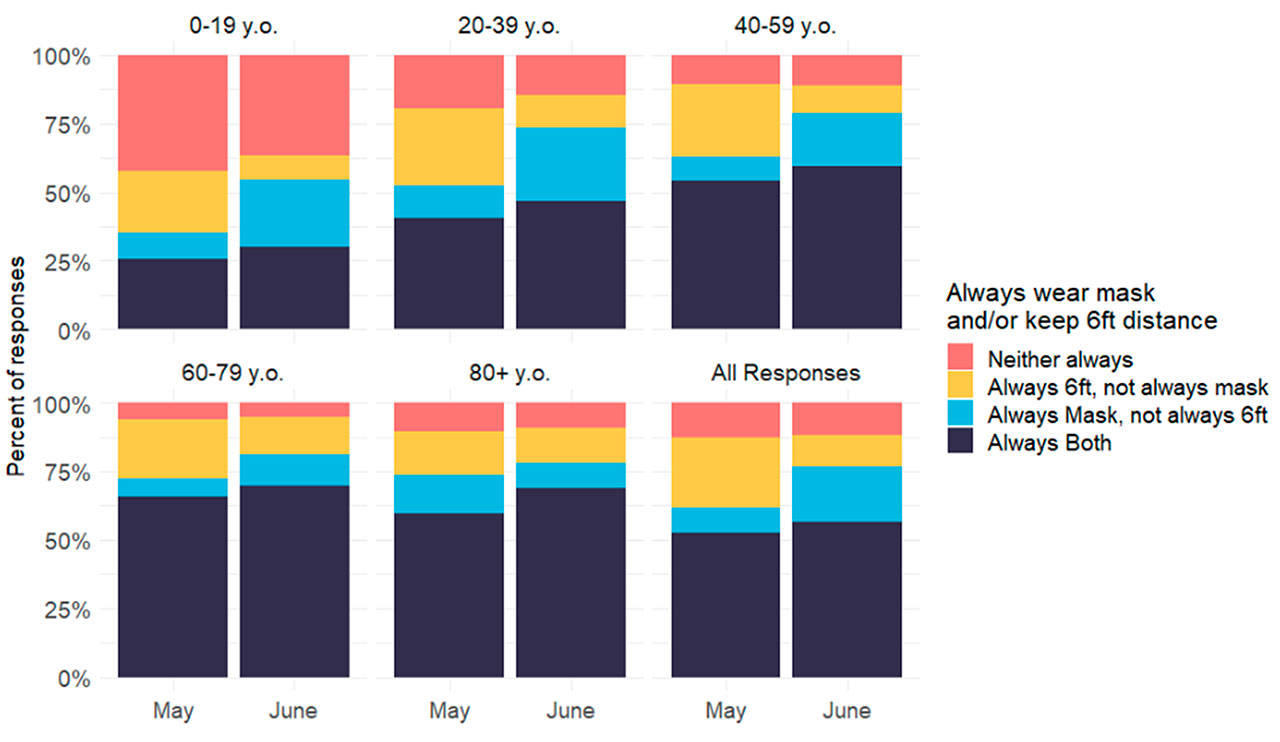The following was written by Mike Famulare and Roy Burstein (IDM) on behalf of SCAN and Public Health Insider — Seattle King County:
Since May 7, the greater Seattle Coronavirus Assessment Network — or SCAN — has been asking volunteers to fill out a survey about their mask and physical distancing habits.
Through June 30, SCAN survey respondents have reported increased rates of mask usage across all age groups. However, as the percentage of people who say they always wear face masks has gone up, the percentage who say they always try to stay six feet away from people who do not live with them has gone down.
This is particularly evident among those between the ages of 20 and 59. Approximately half of these survey participants report that they always both use a face mask and adhere to physical distancing recommendations. One in seven in this group said they only sometimes or never do either. This mirrors the shift of the epidemic into younger people over time.
Given the recent increase in cases of COVID-19 among younger adults, these results suggest there is significant room for improvement in behaviors that could decrease transmission.
While the majority of SCAN survey respondents report they always wear face masks in public and always try to stay six feet away from people who don’t live with them, SCAN respondents are a self-selected group and the results of this survey may not reflect behaviors in the wider population. Those who responded to the survey may be more conscious of or concerned about COVID-19, and therefore exhibit higher rates of mask use and distancing. Furthermore, self-reported behaviors may not reflect actual practices. For these reasons, mask usage and social distancing adherence in King County may be even lower than these results suggest.
Social distancing is the most effective single action individuals can take to decrease risk for COVID-19. Masks are worn primarily to protect others because COVID-19 can spread from people who don’t have symptoms. Although face masks may provide some protection to the wearer, the degree of protection is not certain. Because neither intervention alone blocks all transmission, both are needed. This is especially important when the mask doesn’t always stay on as when eating in groups or when spending a lot of time together or indoors (both of which increase risk and should be avoided). Masks don’t replace the need for distancing and other measures we can take to block the spread of COVID-19.
Recently, cases have begun to increase quickly in King County with an estimated effective reproductive number solidly above 1 for the first time since late March.
There’s nothing stopping COVID-19 from overwhelming us except the choices we all make. So, to stay healthy and prevent spreading COVID-19, please limit close contact with others outside the home, avoid crowded and poorly-ventilated spaces, wear your mask, and keep your distance!
SCAN (the greater Seattle Coronavirus Assessment Network) is a research study conducted by the team behind the Seattle Flu Study, in association with Public Health — Seattle & King County. It is executed by the Brotman Baty Institute, a collaboration between UW Medicine, Fred Hutchinson Cancer Research Center, and Seattle Children’s. SCAN relies on data modeling support from the Institute for Disease Modeling (IDM). It is funded by Gates Ventures (the private office of Bill Gates) and receives technical assistance from the Bill & Melinda Gates Foundation and the Centers for Disease Control and Prevention.
*Survey respondents were not necessarily enrollees in SCAN’s home testing program, but respondents to an optional web questionnaire, which was maintained during the project’s recent testing pause.
** Results as of June 30, 2020.


